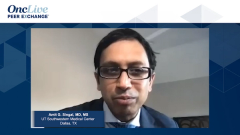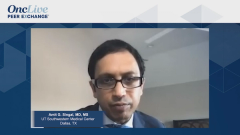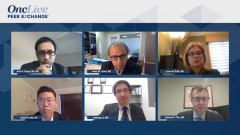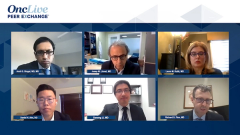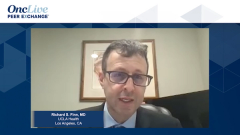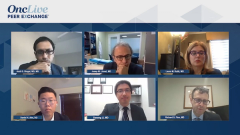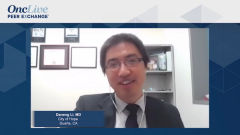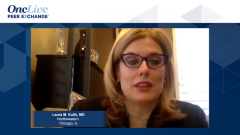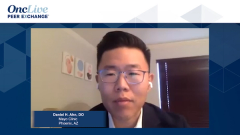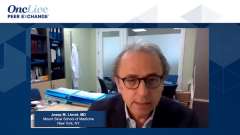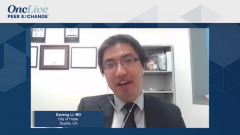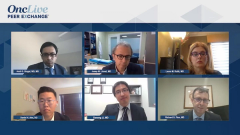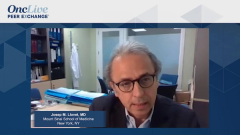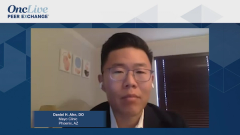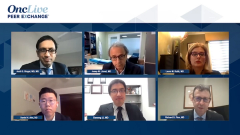
Final Thoughts on the Future of Liver Cancer
A panel of experts lead by Richard S. Finn, MD, provide their final thoughts on the future of advanced unresectable liver cancer.
Episodes in this series

Richard S. Finn, MD: Thank you all for a very rich and informative discussion. Before we conclude, let’s get a final thought from all our panelists. Daniel Ahn from the Mayo Clinic in Arizona, can you give us some of your thoughts on the future of liver cancer?
Daniel H. Ahn, DO: A lot has changed over the past decade, providing a lot more treatment options for our patients with the establishment of the combination of VEGF and I/O [immuno-oncology] therapies from the frontline setting. We do have a lot more exciting phase 3 studies that will hopefully pan out, and if deemed positive, we’re going to be dealt a bevy of options for our patients. Ultimately, it is going to come down to understanding the sequencing as well as the potential biomarkers in terms of how to best approach each individualized patient in treating this disease.
Richard S. Finn, MD: Dr Laura Kulik from Northwestern University in Chicago, what is your hepatology perspective?
Laura M. Kulik, MD: We’re on the right road. I am most interested in how we will use these exciting new agents and how they will be integrated with the therapies that are known to be curative, such as transplant and resection. We are going to see patients who have a great response, who we will bring up the potential of having 1 of the surgical options.
Richard S. Finn, MD: Dr Dan Li at City of Hope in Duarte, California, your final thoughts?
Daneng Li, MD: The treatments for advanced liver cancer continue to rapidly expand. It is becoming a race in the first-line setting and then potentially in the intermediate stage.
However, we shouldn’t forget about the later lines of therapy because that affords us options for these patients who have an unmet need. Even looking at novel individualized treatment options, for example with cellular-based therapies, it going to be a different avenue to potentially help these patients and create another bridge for further treatment.
Richard S. Finn, MD: For sure. A whole area we didn’t even get to about the evolving CAR [chimeric antigen receptor] T-cell therapy and SPEAR [specific peptide-enhanced affinity receptor] T-cell therapy approaches.
Dr Josep Llovet from Mount Sinai in New York, you have a great historical perspective seeing the field evolve. Where does it stand?
Josep M. Llovet, MD: Now is the best time for HCC [hepatocellular carcinoma]. We are at the dawn of a new era of combination therapy, and the era of single-agent frontline. We will probably have more than 1 option in the frontline setting in advanced HCC, and I hope for intermediate HCC. Where we have had TACE [transarterial chemoembolization] as a standard of care the last few years, we will raise the bar. With these combinations, this may happen.
Also, in the neoadjuvant and adjuvant setting, there is a clear unmet need. These drugs may have an impact there hopefully.
Richard S. Finn, MD: Amit Singal, from UT [University of Texas] Southwestern Medical Center.
Amit G. Singal, MD, MS: To touch on what Laura and Josep said, we’ve seen tremendous advances in the systemic therapy space that are going to be used in combination with earlier stages of disease.
We’ve seen that this is an entire spectrum of therapies that are offered by different providers. Much like the composition of the group of us here, the multidisciplinary approach is critical when you think about the best treatment options for patients with HCC.
You can get all of us in a room, whether this is a conference or a clinic. But we’re sitting and trying to figure out the best approach not only upfront but as you go through. We’re seeing this stage migration. You see patients move from the left side, where they move from curative therapies to locoregional or advanced stage. Now with increasing responses, we’re going to see patients move to the left. You’re going to see patients who start with that advanced-stage setting get treated and downstage.
We have to make sure that we’re constantly reassessing and moving people to the therapies that provide that best survival, and the only way that’s possible is a multidisciplinary approach.
Richard S. Finn, MD: Yes, I would echo that 100%. It’s all patient selection: getting the right patient to the right treatment at the right time.
Thank you again to my colleagues and to you in the audience. I hope you found this OncLive® Peer Exchange® discussion useful and will be able to integrate some of our discussion into your practice. Thank you very much.
Transcript Edited for Clarity


